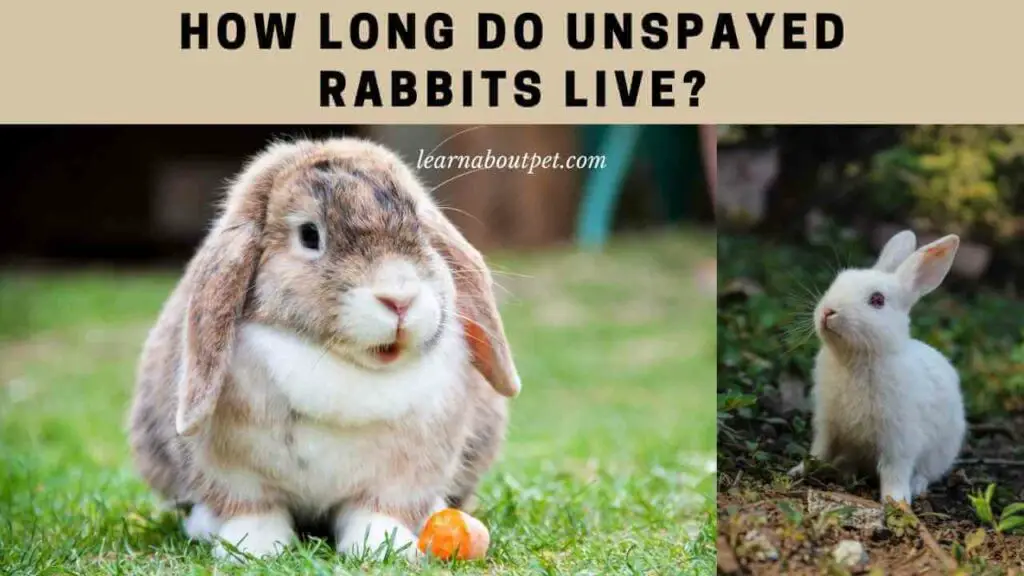Rabbits are a curious lot when it comes to their health and well-being. It is not uncommon to wonder how long rabbits live in captivity. Many people believe that the lifespan of rabbits can be quite short if they are not spayed or neutered.
How long do unspayed rabbits live? Rabbits that live as pets can have an average lifespan of 8-12 years. But will only have a lifespan of between 4 to 7 if remaining unspayed. From the research, female bunnies have an 80% chance of developing uterine cancer after four years old. It will reduce their life expectancy.
To find out what the benefits of spaying are, when to do it, and what happens if you have an unspayed rabbit, read this article to the end.

What Is Spaying?
Spaying or neutering is a surgical procedure that permanently removes the rabbit’s reproductive organs (including the ovaries and uterus) to prevent reproduction.
Spaying rabbits is safe when done by a licensed veterinarian. Before the procedure can take place, both you and your veterinarian will need to go over the possible risks, procedures, and recovery time.
The surgery itself is usually quick and painless. There is no recovery time. After spaying a rabbit, the female will be monitored carefully for several days to ensure that she is not experiencing any pain.
The vet will test the rabbit’s appetite for several days to ensure that she receives the appropriate nutrition.
Rabbits are not like dogs and cats who can be unspayed or unneutered and then return to their usual healthy, playful self. The unspayed rabbit will have the risk of uterine diseases and ovarian cancers.
How Long Do Unspayed Rabbits Live?
The average lifespan of domestic rabbits is around 4-7 years when they are unspayed. Some can enjoy a longer lifespan if it’s spayed. They will likely live an average lifespan of 8-12 years if they are in good health.
Although rabbits are called cute and submissive animals, they will show aggressive behavior when they have reached sexual maturity. It can happen to their owners and other rabbits.
Spayed rabbits are much calmer and affectionate who can live happily with other rabbits. Spaying has a crucial effect on unwanted pregnancies. If bunnies are allowed to continue to reproduce, you will be overwhelmed by rabbit overpopulation.
If the owner couldn’t afford to take care of so many rabbits, there was no other way to release them into the wild with challenging life or sell them to a pet store for a low price.
Why Should I Spay My Rabbit?
Rabbits are social animals, and being in the company of other rabbits means that they feel secure and comfortable. When they are spayed or neutered, they grow up to be more outgoing and friendly.
Another reason why spaying a female rabbit is beneficial is that the rabbit may suffer from the side effects of female hormones. These can include everything from reduced libido to changes in body shape and hair loss.
Female hormones can cause problems during pregnancy, such as excessive hair shedding and fatigue. When the rabbit is spayed, the rabbit’s hormones are balanced out, so the rabbit will not suffer from any of these issues.
Spayed rabbits also live longer than non-spayed ones. So if you plan on keeping your rabbit for a long time as a pet, getting it spayed is a good idea.
Not only does the surgery provide the rabbits with the physical benefits of fertility, but it also offers psychological benefits. Rabbits that are unspayed also experience other behavioral changes, including reduced playfulness and increased aloofness.
How long do unspayed rabbits live? Only 4-7 years if they stay unspayed. Unspayed rabbits are more likely to develop cancer.
What Happens If You Don’t Spay A Rabbit?
You will get the possibility of the rabbit developing a disease or a fatal condition. It is best to spay a rabbit as soon as you can. Spaying a rabbit is the easiest way to prevent unwanted children from coming into contact with your pet. Although it is often recommended before mating, it is possible to spay a rabbit even if you have already mated with a rabbit.
Many of the methods that are used to prevent unwanted pregnancies work by preventing the sperm from reaching the eggs. Your vet will be able to tell you which procedure should be used to accomplish this task.
You will notice that after spaying a rabbit, she will become more active than before. Her litter box will start to smell better, and you will notice that she will try to go potty near you more often.
There will be less need for you to walk around and take care of her because she will be so happy to be in your company.
How long do unspayed rabbits live? The average is no more than eight years. Unspayed rabbits have less life expectancy because they are more susceptible to ovarian cancers.
What Is The Best Time To Spay A Female Rabbit?
Rabbits can have a spaying procedure at any time after entering sexual maturity between 3-7 months of age. Your veterinarian will have specific reasons for doing so.
If your pet reaches this age, it is probably best to wait until she has ceased breeding to allow the reproductive system time to settle.
It is also essential to give your female enough time to recover from giving birth as her reproductive system needs time to heal before proceeding with the procedure.
Also, some females may require the procedure done immediately after giving birth as they could potentially be healing by then.
The best time for this procedure is springtime. When you spay a female rabbit, it will be able to recover from the operation quickly and won’t miss any shots. The stitches will stay in place for a lifetime, so you don’t have to worry about them coming out.
Spaying a rabbit is usually a pain-free procedure, and the rabbit comes back looking and feeling normal within a few days.
How long do unspayed rabbits live? Not as long as a spayed rabbit does. You can only expect to have healthy unspayed rabbits that are only 4-7 years old.
Is Spaying Safe For Rabbit?
The goal is to reduce fertility in rabbits and prevent reproduction by females. The surgery can be performed on an older female that has not been pregnant, or an immature female rabbit that is likely to become pregnant soon.
Spaying of rabbits is usually performed by a veterinarian who specializes in animals. This doctor will perform tests and find out the best way to spay your rabbit.
You will need to ensure that your pet rabbit is in good health before undergoing any surgical procedure. Even though your female rabbit is genetically healthy, it could still have an operation procedure performed which interferes with hormones.
Spaying has been proven safe for rabbits for decades. It is one of the first procedures most vets recommend for pets. If you have a plan to keep one as a companion or pet, spaying is the option you should choose. Having a pet with no risk of having a baby is nice, too.

Can I leave Rabbit Unspayed?
If you have a plan to have more than one rabbit and plan to breed them, you will want to raise your rabbits to be unspayed. Female rabbits usually get spayed at four to six weeks of age. Spaying a rabbit can be started when the rabbit is sexually mature.
Some owners want to have many rabbits. Some only want to have a few and do not want to add to the results of breeding. Having a lot of rabbits from breeding takes a lot of space and costs to care for.
Spaying a female can decrease the number of litter you can have. While breeding with an unspayed female will increase the number. The decision is returned to the owner by knowing the risks that the rabbit can take.
If you can’t control the birth of rabbits, there will be overpopulation, and you will be overwhelmed to take care of all of them if you are not ready to practice breeding.
Unspayed will give the possibility of uterine or ovarian disease, less the rabbit life expectancy. How long do unspayed rabbits live? No more than 7 years if a rabbit is susceptible to disease.
Do All Unspayed Rabbits Get Cancer?
As a rabbit owner, I have been curious about the risk of ovarian cancer among rabbits that have not been spayed or neutered.
This does not mean that you should never spay or neuter your rabbit, but it does mean that you need to be more careful when evaluating the risk factors for ovarian cancer in unspayed female rabbits.
Unspayed female rabbits are at a greater risk of getting this form of cancer because their reproductive organs are not functioning properly. Their chances of having benign tumors increase dramatically.
How long do unspayed rabbits live? If there is a high chance of getting ovarian cancer, the rabbit’s chances of survival are no more than 4-7 years.
Symptoms Of Unspayed Rabbits Getting Womb Cancer
Like all other types of cancer in mammals, it begins with a small tumor that grows over time. It generally bursts, although in some cases a benign tumor can form and remain undetected for years. It happens because the growth is so small, that if left untreated, it can be very serious.
The symptoms of an unspayed female rabbit are usually not severe at first, but the illness will usually progress quickly. The female will exhibit more frequent urination, will produce larger quantities of urine, and become increasingly uncomfortable.
As the tumors increase in the size of the uterus it will become noticeably smaller. By the time cancer has spread significantly to other areas of her body, it can turn life-threatening.
If you suspect that your rabbit has womens’ tumors, get it to a veterinarian as soon as possible. The vet will do a blood test to see any existing cancer or hormonal imbalances that may be causing the tumors.
How long do unspayed rabbits live? Unspayed rabbits have less life expectancy because it is easier for tumors and cancer to appear.
Advantages Of Having Female Rabbits Spayed
The advantages of having female rabbits spayed are too many to list. Rabbits are beloved pets and should be treated as such. The table below are some of the benefits that your female rabbit can get.
| Benefit | Explanation |
| Unspayed females have potentially fatal conditions | Female rabbits can get uterine cancer and infection of the womb. |
| Prevent mammary tumors | Reduces the chance of developing mammary tumors after the spaying procedure. |
| Unspayed rabbits are aggressive | Rabbits might growl, bite, scratch, and lunge at their owners as they enter the mating season. |
| There is no problem if more than one spayed rabbit put in the same cage | Because they are less aggressive and more friendly, female rabbits can have friends in the same cage without fighting. |
Final Verdict – How Long Do Unspayed Rabbits Live
How long do unspayed rabbits live? Unspayed Rabbits life expectancy is lower than rabbits that have gone through the spaying procedure. If normal rabbits have 8-12 years lifespan, unspayed rabbits only have 4-7 years.
Rabbits are social animals and often display signs of aggression toward other rabbits. Neutering or spaying prevents the possibility of these aggressive behaviors because the female will be unable to breed.

One advantage of neutering is that the chance of an unwanted pregnancy exists. Rabbits have a habit of getting pregnant, even when they are neutered. However, if you take advantage of having your pet bunny spayed before getting pregnant, you may be able to avoid this possibility.
The disadvantages of having female rabbits spayed are rare. More loss if you have an unspayed rabbit. Besides being more aggressive, unspayed rabbits are more susceptible to tumors, uterine diseases, and infections in their womb. Read this research on should we advocate all pet rabbits to be spayed to understand at a deeper level.
As a pet lover, make sure to learn about pet more and give your pet rabbits a good and comfortable life!

Welcome to Learn About Pet. My name is Rajkumar Ravichandran and I love all pets, travel, and amazing food. I write about my passion and personal experience caring for multiple pets in this blog! ❤️
Post Disclaimer
DISCLAIMER: THIS BLOG OR WEBSITE, "Learn About Pet", DOES NOT PROVIDE YOU WITH MEDICAL ADVICE AND IS NOT A SUBSTITUTE FOR MEDICAL ADVICE. ALWAYS GET IN TOUCH WITH YOUR PERSONAL VETERINARIAN AND USE INFORMATION HERE AS GENERAL ADVICE.
The information, including but not limited to, text, graphics, images and other material contained on this website are for informational purposes only. No material on this site is intended to be a substitute for professional veterinary advice, food recommendation, diagnosis, or treatment. Always seek the advice of your veterinarian or other qualified health care provider with any questions you may have regarding a medical condition or for pet food related questions.







